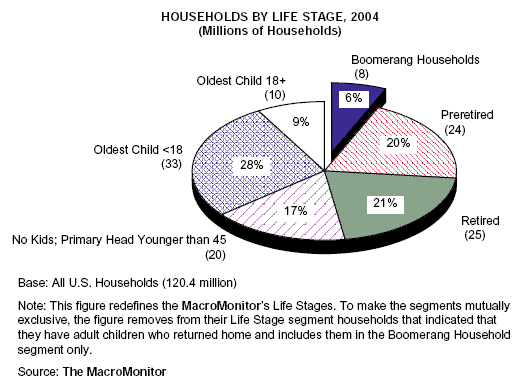Boomerang Households: Financial Consequences of an Emerging Social Phenomenon MacroMonitor Marketing Report Vol. VII, No. 5 April 2006
Since 2002, the MacroMonitor has identified a significant number of U.S. households that have adult children who returned to live with their parents but whom the parents cannot claim as dependents on the household's tax returns. This emerging consumer market—Boomerang households—numbers almost 8 million households and accounts for 6% of the total U.S. household population in 2004. The adult children living under their parents' umbrella undoubtedly have an impact on the household's finances and the parents ability to achieve their financial goals. This report focuses on these Boomerang households—both the parents and the adult children—so that financial institutions might prepare better to meet the varied needs of this growing household segment.
For a variety of reasons, more of today's young adults than in the past appear to be delaying the pursuit of life's passages: leaving home, marrying, and having children. The harsh economic reality that young adults now face when they venture out on their own and the difficulty that they have in living within their means are perhaps the most compelling reasons why they choose to live with their parents. The MacroMonitor data about financially independent Under-30 households indicate that young adults today are more likely than other U.S. households to be saddled with debt (other than mortgage loans)—especially education and high-interest consumer loans.
Financial institutions that wish to meet the financial needs of Boomerang households may need to use a dual approach: one for the parents and one for the adult children. On the one hand, it behooves a financial adviser to emphasize to the parents of Boomerang kids the need not to jeopardize their own retirement when taking an adult child back under their wings. On the other hand, the financial professional could help the Boomerang kids manage their debt and offer savings incentives from their work income (no matter how meager). Helping consumers establish a financial roadmap, whether for those nearing retirement or for those just starting to establish financial independence, is a win-win situation, benefiting both Boomerang households and financial institutions.
Bottom line: Providing financial advice and education and offering creative new product combinations to Boomerang households present an emerging market opportunity.
 |
For a variety of reasons, more of today's young adults than in the past appear to be delaying the pursuit of life's passages: leaving home, marrying, and having children. The harsh economic reality that young adults now face when they venture out on their own and the difficulty that they have in living within their means are perhaps the most compelling reasons why they choose to live with their parents. The MacroMonitor data about financially independent Under-30 households indicate that young adults today are more likely than other U.S. households to be saddled with debt (other than mortgage loans)—especially education and high-interest consumer loans.
Financial institutions that wish to meet the financial needs of Boomerang households may need to use a dual approach: one for the parents and one for the adult children. On the one hand, it behooves a financial adviser to emphasize to the parents of Boomerang kids the need not to jeopardize their own retirement when taking an adult child back under their wings. On the other hand, the financial professional could help the Boomerang kids manage their debt and offer savings incentives from their work income (no matter how meager). Helping consumers establish a financial roadmap, whether for those nearing retirement or for those just starting to establish financial independence, is a win-win situation, benefiting both Boomerang households and financial institutions.
Bottom line: Providing financial advice and education and offering creative new product combinations to Boomerang households present an emerging market opportunity.